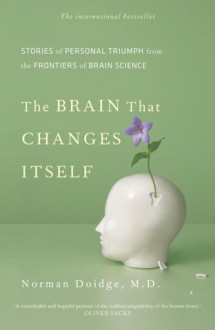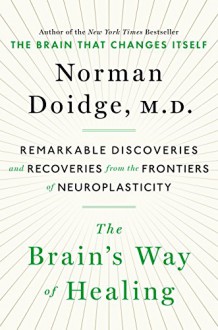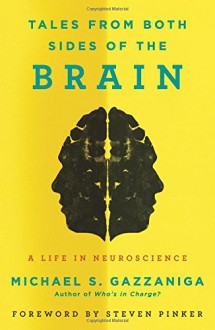
A truly interesting story and program that I had never heard of. It makes me wish this kind of testing and solutions were more prolific.
This is the kind of title that really catches my attention, especially in non-fiction. I'm a huge fan of non-fiction. The whole concept of the Arrowsmith school amazes me. This book not only does a great job of recounting the life of Barbara Arrowsmith-Young, in her own words, but also many of the categories of deficits that people can have and that hinder their potential. I found myself thinking about some bright underachievers I know and wondering if the program would suit them.
The idea that you can simply train your brain past learning disorders by finding a way to trigger that part of the brain into action is exciting. The possibilities then seem endless for everyone. I know that there are implementation issues, especially since it doesn't seem feasible that this can be done online for now and because not many schools have this program yet, but I'm hopeful, given the growth the program has had and the countless success stories. Maybe we'll look back one day at all the research and programs done by the Arrowsmith team and see an entirely different world for children and their potential than we do now.
While her own story and the formation of the school were interesting, I was particularly drawn to the stories of the students and the cognitive exercises created to help them past their learning disorders. I was surprised that it sometimes took years after starting a set of exercises to really see progress in normal life, but that students persisted through them. I know far too many people that would have given up in a few weeks if they weren't seeing improvement. I was also impressed with the parents who sent their children to be evaluated and who enrolled them into the school later. I looked up the school and just the evaluation is $2000. But in the words of one person, "You pay it now or you pay it later."
I can't remember if that was a student or a parent, but it remains a good point. The people who benefit from this program are people who are intelligent but have learning disorders that hinder their ability to get a rounded education and then later hinder their ability to get or keep a good job. Many of the adult students had been labeled "bright but lazy" or as underachievers because a deficit, as the book actually calls it, kept them from learning a skill that they needed.
I really did appreciated using "deficit" instead of "disorder". It was a great substitution because deficit implies that a person doesn't have something rather the way disorder makes it seem like something is wrong with that person. Maybe it's just semantics but I feel like picking up a skill that's hard to get is a lot better of a way to frame it than trying to "fix" someone.
This was a fascinating read, well listen. I listened to the audiobook while I was cleaning the house I was moving out of and then while doing some prep work on the one that I moved into. I would just let it run, set up on a chair, and my husband wandered in after a while to comment on how interesting he was finding it too. It amused me because normally he couldn't care less about whatever book I'm playing. It caught his attention too because of the way it takes great care to describe each deficit, tie it to a personal experience of some student, give a way to relate to it or experience a small part of the decifit and then elaborate on what was done to attain the skill that it blocked. It also went into the coping or compensation methods that the students had prior to being treated, which were fascinating to listen to. We all compensate for things we aren't so good at with things we are good at, but the level of compensations necessary were astounding.
My husband also recently had a concussion and his resulting troubles added a new level of interest for me to the work that had originally drawn Young to her work, Alexander Luria's work with brain trauma. That was an interesting story that I'd like to read one day too.
I did find it a little disappointing that the book didn't go into deeper detail on the exercises that were created to address some of the deficits, but I get the risk that could be imposed in doing so. I wouldn't want any sort of medical book to be detailed enough for someone with half an inclination to try to fix themselves or those around them. It should be left to professionals.
Personally, I think it would be great if everyone who works with children had read the book and if there were many more programs in schools. I am not proposing the system subscribe to this one method but I feel like it could be a good augment to many existing programs that address learning disorders. Schools could potentially do an assessment on students at the beginning of giving them compensations so that they could both get by with what they can do now, but also attain the missing skill when possible. It seems like that would be a win for everyone. But I'm no professional and wouldn't know the reasons for not incorporating something like this in a school system other than cost. I do get how costs of things can be prohibitive in public school systems and, as stated above, the assessment is quite expensive.

 Log in with Facebook
Log in with Facebook 

 travelling mp3, new car and an open road...
travelling mp3, new car and an open road... Doidge is not a man you would want to invite for dinner as he has no humanity. MANY animals were harmed in the making of book, sickeningly so, and on many occasions seemed to me, unnecessary numbers. Overkill on overkill just for the sake of proving what we all intuitively know already 'Use it or Lose it'.
Doidge is not a man you would want to invite for dinner as he has no humanity. MANY animals were harmed in the making of book, sickeningly so, and on many occasions seemed to me, unnecessary numbers. Overkill on overkill just for the sake of proving what we all intuitively know already 'Use it or Lose it'.







